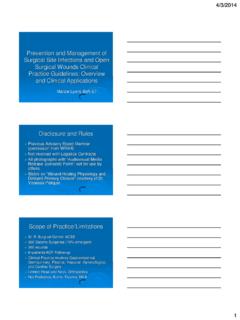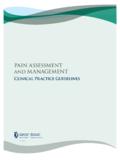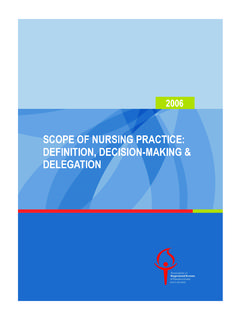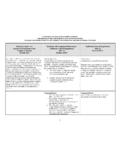Transcription of Approved By: Pages: FAMILY MEDICINE / PRIMARY CARE ...
1 Operating Guideline: Guideline Number Management of Telephone Inquires PCOG # 5. & Telephone Triage Approved By: pages : FAMILY MEDICINE / Page 1 of 9. PRIMARY CARE PRIMARY Care Management Team OPERATING. GUIDELINE Approval Date: Supercedes: July 9, 2015 New 1. INTENT. In PRIMARY care, effective management of telephone inquiries facilitates the right care by the right provider at the right time. Guidelines for managing telephone inquiries and telephone triage are needed to facilitate appropriate care, including prioritization of same day appointments and suggesting other resources. Clinic teams are required to have a telephone inquiry and triage workflow that details roles and responsibilities within the clinic team. NURSING TRIAGE EDUCATIONAL RECOMMENDATIONS: CRNM Telephone Consultation Canadian Triage and Acuity Scales National Guidelines Triage Scale for Behavioural Emergencies DRAFT to be located in EMR. Telephone Triage Clinical Content Important Aspects Telephone Triage Clinical Content Important Aspects and Telephone Triage Learning Center Triagelogic Learning a Center and Triage Logic Protocols Adult and Pediatric Office Hours Key Books Available Telephone Triage Protocols for Nurses Julie K.
2 Briggs Fourth edition (July 2011). Pediatric Telephone Protocols by Barton D. Schmitt MD FAAP Publisher: American Academy of Pediatrics; Fourteenth Edition, new edition (October 10, 2012). Adult Telephone Protocols by Barton D. Schmitt MD FAAP Publisher: American Academy of Pediatrics; Fourteenth Edition, new edition (November, 2012). a To be reviewed and / or another online resource explored to assist with the training and education needs of Clinical Support Staff to ensure they are able to handle scenarios inside and outside of these requests. 2. DEFINITIONS. Over-referral is a term used to describe when a patient is directed to a level of care more urgent than needed. Over-referral leads to unnecessary ambulance runs (EMS 911), excessive emergency department 1. visits, and increased cost to the patient and health care system. Under-referral is a term used to describe referring the patient to a disposition level lower than ideal. Delays 1. in diagnosis and treatment can lead to adverse outcomes.
3 Clinical Support Staff (CSS): In this guideline this refers to PRIMARY Care Assistants, Unit Clerks, Front End Reception and also comprise of the patient's medical home team. KEY EXPECTATIONS. When answering the phone, never put on a caller on hold without finding out why they are calling, in case it is an emergency. NOTE: When multiple incoming telephone inquiries and the designated Phone Manager has more than two incoming phone calls it is expected that the designated CSS Phone Manager' receives assistance from their peers to ensure we expedite all incoming telephone inquiries. Patients requiring clinical advice should be promptly re-directed to a PRIMARY Care Nurse. Receptionists/. PCAs, cannot provide clinical advice. Operating Guideline: Guideline Number Management of Telephone Inquires PCOG # 5. & Telephone Triage Approved By: pages : FAMILY MEDICINE / Page 2 of 9. PRIMARY CARE PRIMARY Care Management Team OPERATING. GUIDELINE Approval Date: Supercedes: July 9, 2015 New Telephone care should not be provided to patients with whom the clinic does not have an existing relationship.
4 However, it is expected a No Wrong Door approach is used with every encounter. This provides individuals with or links them to appropriate service interventions regardless of where they enter the system of care. This principle commits all PRIMARY care services to respond to the individual's stated and assessed needs through either direct service or a linkage to appropriate programs, as opposed to sending the person from one agency to another. Welcoming goes beyond the individual's initial contact with a service and must be incorporated into every contact between patients or individuals who do or do not have an existing relationship with the clinic and all staff of the PRIMARY Care program. Welcoming conveys the spirit of No Wrong Door.. Non-patients should be directed to other options as follows: o their PRIMARY care provider (suggest the FAMILY Doctor Finder if they currently do not have one and your clinic is not currently able to take new patients), o the nearest Quick Care Clinic or After Hours Walk In Clinic or o Health Links-Info Sant.
5 Any team member can provide a non-patient with this information. Clinics will have staff available to respond to telephone inquiries during posted operating hours. Professional staff are to be available to provide clinical triage. PC Operating Guideline PC OG #. 27: Physician Work Schedule Planning and Process outlines minimum staffing levels for PRIMARY Care clinics and closure procedures in the event minimum staffing levels cannot be met. All telephone care provided by regulated health professionals shall be documented in the EMR and labeled as a Telephone Note . A medical history using advanced assessment skills with a brief description of the patient illness using SOAP notes (macros or clinical note templates), identify the chief complaint and most serious symptom, select the correct triage protocol, triage the patient into an appropriate disposition category and provide care advice (judgment which includes critical thinking ability & compassion), give call - back or appointment instructions to caller.
6 Compassion is a key trait needed to effectively manage telephone inquiries of all callers. Treating callers with compassion helps them feel comfortable, allowing all clinic team members to focus on assessing their situation. The key to successfully handling a difficult caller is to communicate in a manner that diffuses the caller's frustration while keeping both of you calm. Examples of common difficult caller situations: (angry or frustrated callers, abusive callers or difficult situations) and how to effectively manage the call can be found Telephone Triage Managing Difficult Telephone Triage Calls (2014). 3. GUIDELINES. Roles and Responsibilities Although any clinic team member may have a role in the management of telephone inquiries and telephone triage, the general clinic process is that incoming phone calls to the clinic are answered by the PRIMARY Care Assistant (PCA) and phone calls requiring clinical advice and triage are managed by the PRIMARY Care Nurse (PCN).
7 PRIMARY Care Assistant Role Receptionists/PCAs, shall not provide clinical advice or assessment. Staff in these roles are expected to ask the patient the reason for the appointment and therefore receive a variety of Operating Guideline: Guideline Number Management of Telephone Inquires PCOG # 5. & Telephone Triage Approved By: pages : FAMILY MEDICINE / Page 3 of 9. PRIMARY CARE PRIMARY Care Management Team OPERATING. GUIDELINE Approval Date: Supercedes: July 9, 2015 New responses that may require either more immediate attention or evaluation and next steps prior the scheduled appointment. Staff in these roles may provide general information, such as a date for a specialty appointment. The role of the PCA/receptionist is to gather key information and appropriately re-direct callers, ( , to speak with a PCN or other PRIMARY care provider (Physician, Nurse Practitioner, Physician Assistant) for further assessment and specific advice. This includes if the caller is unsure whether they should be booking an appointment or if they should go to an emergency department.)
8 PRIMARY Care Assistant Responsibilities Management of Telephone Inquiries Greeting: include name of clinic, first name and role Gather Information: Obtain the caller's full name and verify phone number in case the call is prematurely disconnected. Verify they are a current patient of the clinic See PCOG #23: Two Client Identifiers. If not, follow the clinic's process for taking new or transferred patients See PCOG #5. Access and Transfers Reason for call, , routine appointment booking, in need of medical advice, or other information, , date of specialist and follow PCOG# 29: Optimizing Team Roles through Appointment Types and Reasons If in need of medical advice, find out if this is a medical emergency? See APPENDIX A lists examples of potential emergencies and responses. o If yes, immediately find a PCN or other PCP (Nurse Practitioner, Physician, Physician Assistant) to speak with the patient. RATIONALE: PCA's should not decide the level of the acuity or mode of transportation.
9 O If not feasible, and caller is identifying an emergency, direct the caller to dial 9-1-1 or advise the caller they will have to decide if they need someone drive them to the nearest emergency room. o If caller does not have a responsible adult with them, PCA may call 911 for them. Emergencies may be identified by patient/caller, PCN, PCP. o If a call is terminated before any of the clinic team members are satisfied that the client's call has been properly addressed and the clinic team member believes that there is life-threatening risk to the caller or to others, they must consult with their immediate supervisor (Manager or Site Medical Lead) for any actions that need to be taken. Appendix B & C offers guidelines for other types of clinic calls. If reason for call involves communication with clinic team, include in Tasks' and messages to providers to include the following: Who is calling? Ensure messages and tasks are in the patient's name, not the person who called Are they calling about themselves or someone else?
10 Operating Guideline: Guideline Number Management of Telephone Inquires PCOG # 5. & Telephone Triage Approved By: pages : FAMILY MEDICINE / Page 4 of 9. PRIMARY CARE PRIMARY Care Management Team OPERATING. GUIDELINE Approval Date: Supercedes: July 9, 2015 New What are they calling about? What number can they be reached at? Identify what is the level of task urgency Emergent / Very urgent Requires immediate attention Urgent Attention required within 1-2 hours Normal to be evaluated sometime that working day It is expected that Tasks identified as Very Urgent' that any Clinic Team member is interrupted when they are with a patient and Very Urgently required Appointment Booking Utilize Advanced Access principles and practices in appointment booking, to ensure a supply of same-day appointments for patients with more urgent needs, for example, sell late in the week, sell early in the day See PCOG# 12: Advanced Access Strategies. In the absence of adequate appointment availability, calls may need to be directed to the PCN or other PRIMARY care provider ( Physician, Nurse Practitioner) for advice regarding urgency of care needs and where to obtain care.
















